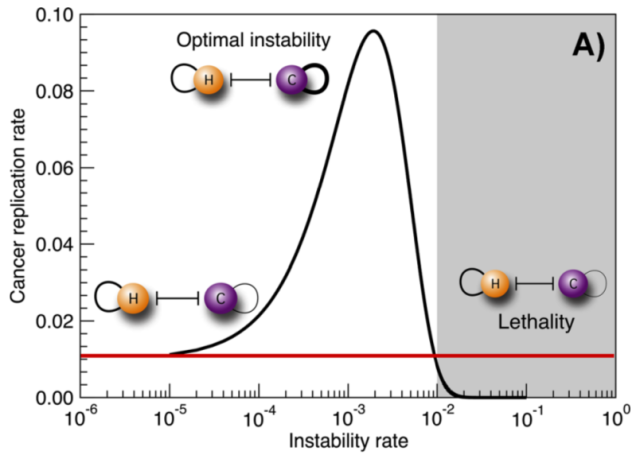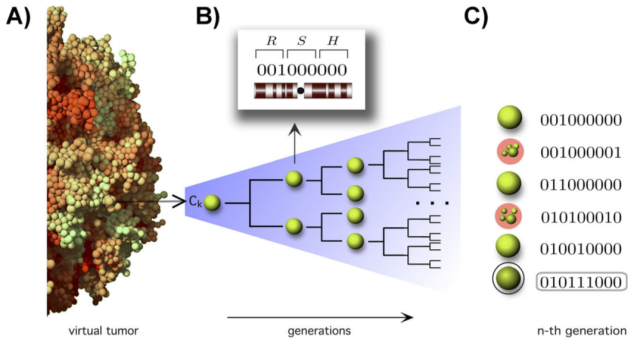Can there be a minimal embodiment for cancer cells? Or, as some of the lab members phrased it in a recent paper: Can a minimal replicating construct be identified as the embodiment of cancer? It looks like the question was just on the tip of the tongue of the research community, given the buzz that our research has generated! (Links to comments and news follow at the end of this post.)
The article (coauthored by Ricard Solé, Sergi Valverde, Carlos Rodríguez-Caso, and Josep Sardanyés) proposes that the instabilities that usually harm our health might be used by a tumor as an engine driving its evolution and replication — faster and more efficient as it degrades. Cancer cells shall achieve this by cutting out non-essential tasks, but the prize to pay is that of memory: tumors won’t have any regards towards their origins — well ordered, healthy tissues. And there is some light in there! Since tumors feel more comfortable as highly unstable entities, they might cross the thin line separating them from a not-viable biological form.
And if a tumor is not ready to jump across this line we might be willing to provide a little push!! This has already been suggested and tested for RNA viruses with interesting theoretical and experimental results.
But, back to the beginning, what is this minimal embodiment that we are talking about? Is it a small cubicle? A human cell reduced to the size of a tiny, prokaryotic bacteria? In the Complex Systems Lab we love abstractions, and so the authors of this paper rely on an abstract description of what’s going on inside a cell. Space is not the most important aspect. Instead, we focus on the tasks performed by proteins and chemicals, and the relationships between them. Such interactions are usually controlled — or rather modeled — by a Gene Regulatory Network. Thus the discussion is about how deep can we prune this network: how many genes can be dismissed, how many interactions between genes can be jeopardized before a tumor looses its replication capabilities. That is the catastrophe that cancer cells must avoid eventually, and they happen to be pretty good at it! As BioEssays Editor-in-Chief Andrew Moore points out: “Cancer is a disease, alright, but the cancer cell’s genome is anything but ‘sick’ “. Indeed, cancer cells are healthy enough to continually get away…
Some people talking about our research:
- In English:
- Andrew More at BioEssays.
- At the Santa Fe Institute.
- In Catalan:
- At the Pompeu Fabra University website.
- In Spanish:
- At EFE Futuro, by the EFE News Agency.


